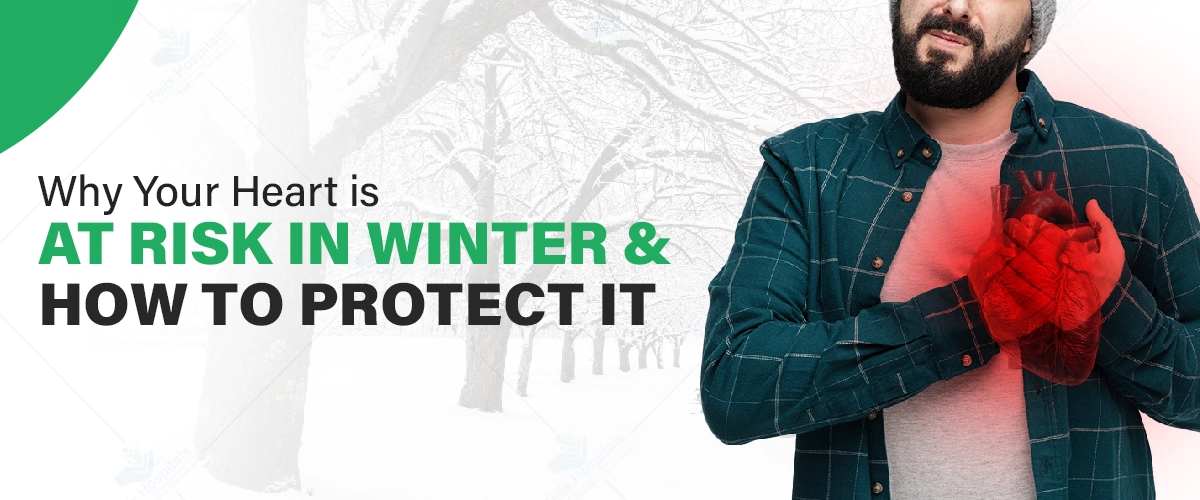
Subscribe to our

Winter can be a beautiful season, but it also brings hidden dangers for your heart. As the temperature drops, your heart faces added stress, and conditions like heart attacks become more prevalent. Understanding why the cold weather puts you at greater risk and learning how to protect yourself is crucial. During the colder months, it’s vital to take extra precautions to safeguard your heart. For the best care, consulting a top heart attack hospital in Noida can provide you with expert guidance tailored to your needs.
Concerned About Your Heart Health? Don't wait until it's too late—take control of your health today by Calling +91 9667064100.
Cold Weather Stress: As temperatures plummet, your body works harder to maintain heat. Cold weather causes blood vessels to constrict, which increases blood pressure and puts strain on the heart. The heart has to pump harder to circulate blood through narrowed arteries, which can lead to heart attacks or other cardiovascular issues.
For those already dealing with heart disease, high blood pressure, or other cardiovascular conditions, winter can pose even greater challenges. Cold temperatures can worsen symptoms, and people with pre-existing conditions are more likely to experience complications, such as a heart attack or stroke. It’s important to monitor your health closely and adjust medications as needed during colder months, in consultation with your healthcare provider.
Physical exertion during winter, such as shoveling snow or participating in winter sports, can be especially taxing on the heart. These activities demand more from your body than they might in warmer weather. Warming up before engaging in outdoor activities and dressing appropriately to keep warm is essential to avoid sudden stress on the heart.
Regular Check-ups: For individuals with heart conditions, regular check-ups are essential. Monitoring blood pressure, cholesterol levels, and overall heart health during winter can help prevent complications. It’s advisable to consult a specialist, especially if you experience any unusual symptoms during the colder months.
In the winter, the cold weather can exacerbate existing heart conditions, and it’s important to be aware of potential warning signs such as:
If you experience any of these symptoms, seek medical attention immediately. Winter should never be a time to ignore your heart health.
At Felix Hospitals, you'll find some of the top cardiologists who specialize in heart attack prevention and treatment. For those concerned about heart health during winter, here are some of the best doctors to consult:
These experts are dedicated to helping you manage and prevent heart issues, ensuring that you stay healthy throughout the winter season.
Prioritize Your Heart Health This Winter, Schedule a consultation with our top cardiologists at Felix Hospitals by Clicking Here.
Winter poses unique challenges to heart health, but with the right precautions, you can reduce the risks. By staying active, dressing warmly, managing your diet, and keeping hydrated, you can protect your heart from the winter chill. If you're at higher risk, consult with a healthcare provider and monitor your health regularly. Remember, preventing winter heart attacks requires proactive care, so don’t hesitate to reach out to a top heart attack hospital in Noida for expert guidance. Also, consider the heart attack surgery cost if you are already at risk, and make informed decisions about your care. Prioritize your heart health and enjoy a safe and healthy winter season.
Q- Why are heart attacks more common in the winter?
Ans- Cold weather causes the blood vessels to constrict, which increases blood pressure and makes the heart work harder. Additionally, cold temperatures can cause an increase in blood clotting, which significantly raises the risk of heart attacks.
Q- How does winter weight gain affect heart health?
Ans- During winter, people tend to exercise less and indulge in comfort foods, leading to weight gain. Excess weight can increase cholesterol levels, raise blood pressure, and contribute to other heart problems, all of which are key factors in cardiovascular disease.
Q- Is it safe to exercise outside in the winter if I have heart disease?
Ans- It is generally safe to exercise outdoors if you have heart disease, but precautions should be taken. Make sure to warm up thoroughly, dress in layers to stay warm, and avoid strenuous activities that may put sudden stress on your heart, such as shoveling heavy snow.
Q- How can dehydration affect heart health in winter?
Ans- Cold, dry air in winter can cause dehydration, making your blood thicker and harder for your heart to pump. This added strain on the heart can increase the risk of complications, especially for individuals already at risk for heart disease.
Q- What are the most common warning signs of heart problems in winter?
Ans- Symptoms such as chest pain, shortness of breath, dizziness, nausea, or cold sweats should be taken seriously, especially in cold weather. If you experience any of these, it's important to seek medical attention immediately to prevent further complications.
Q- How often should I check in with my cardiologist during winter if I have pre-existing heart conditions?
Ans- Individuals with heart conditions should have regular check-ups during the winter months to ensure their health is closely monitored. You may need to adjust medications or treatments based on how your body responds to the cold weather.
Q- What are some natural ways to protect my heart from winter stress?
Ans- Staying active indoors, eating a heart-healthy diet, staying hydrated, managing stress through relaxation techniques, and wearing appropriate clothing to stay warm are all natural ways to protect your heart from winter stress.